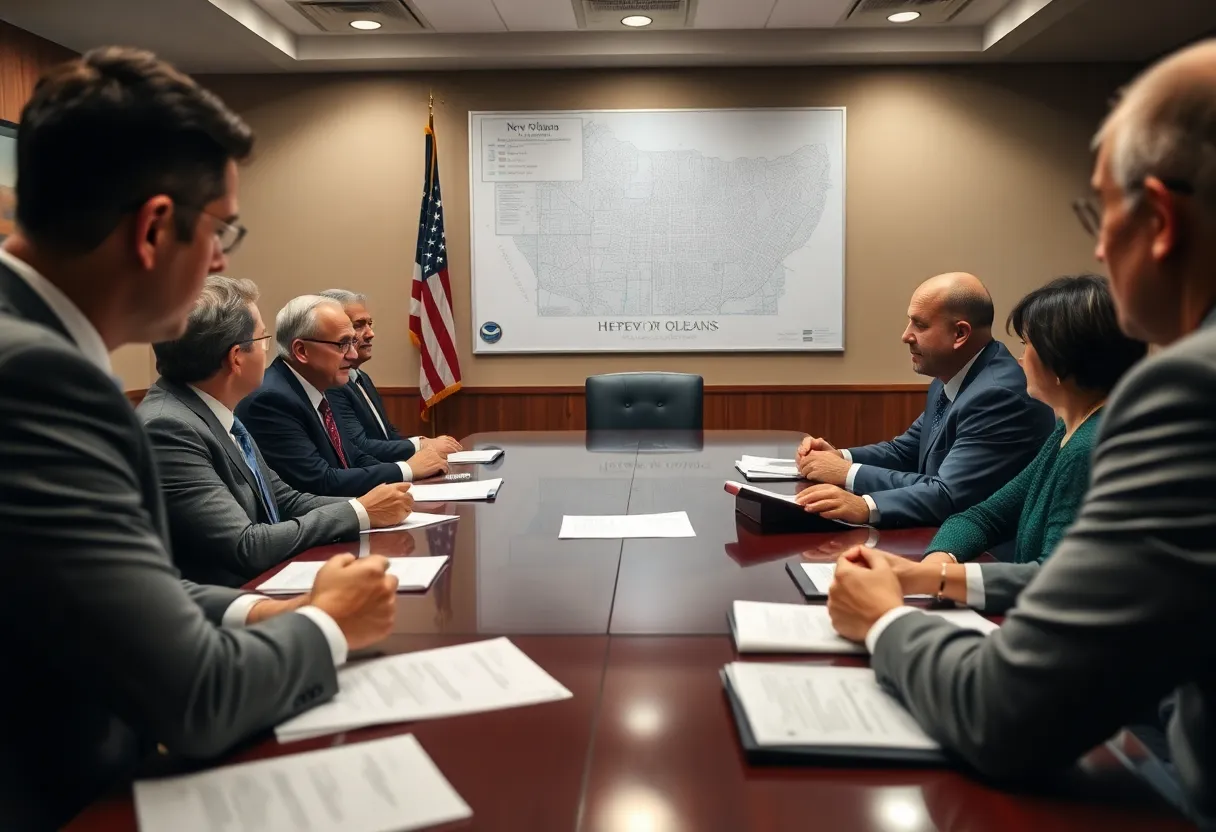News Summary
The FEMA Review Council met in New Orleans to improve disaster response and recovery strategies as discussions centered around future agency reforms. With heightened security, officials expressed concerns over existing federal bureaucracy and emphasized the need for a system that swiftly addresses disaster situations. Governor Landry highlighted New Orleans’ experiences post-Katrina, while President Trump’s intention to phase out FEMA has raised questions about future disaster management. Contributions from Homeland Security Chief Noem and Defense Secretary Hegseth called for an agile disaster response mechanism to better support affected communities.
New Orleans – Security was heightened along Canal Street in New Orleans as President Trump’s FEMA Review Council convened at the U.S. Customs House, marking a pivotal moment in disaster management discussions. This meeting, the second of its kind, was strategically held in New Orleans to underscore the city’s significant history with natural disasters, notably the catastrophic Hurricane Katrina that struck exactly 20 years ago on August 29, 2005.
The council, comprised of various officials and experts, focused on improving response and recovery strategies in the face of natural disasters. Jane Castor, the mayor of Tampa, underlined the pressing need for swift and responsive disaster management systems that can effectively address emergent situations. Louisiana Governor Jeff Landry later addressed the council, emphasizing the necessity for timely federal support during disaster recovery efforts. He expressed concerns over existing federal bureaucracy, which he argued can hinder recovery and delay assistance to affected regions.
In a significant policy shift, President Trump has signaled intentions to phase out FEMA following the current hurricane season. This decision raises questions regarding future disaster management strategies and the role of federal agencies in such crises. Governor Landry highlighted New Orleans’ tumultuous history with FEMA and federal aid post-Katrina, noting long-lasting challenges that still influence recovery efforts today.
The meeting also included contributions from Homeland Security Chief Kristi Noem, who participated virtually, advocating for a reduction in federal bureaucracy and a more agile disaster response mechanism. Defense Secretary Pete Hegseth, also joining virtually, emphasized the profound impacts disasters have on local communities, illustrating the real-world consequences of agency inefficiencies.
Governor Landry called for the establishment of a competent and operational disaster management agency, reflecting concerns over FEMA’s current capabilities. He asserted confidence in the federal government’s ability to provide the necessary support, urging that reform and potential reevaluation of FEMA’s functions be taken into serious consideration.
The FEMA Review Council was created to assess the existing structure and effectiveness of the agency, providing recommendations for reform that may include the elimination of FEMA in its current form or a redefinition of its responsibilities. Noem noted the critical need for FEMA to transition into a responsive agency that complements state efforts in managing disaster recovery.
A report outlining the council’s findings and recommendations regarding FEMA is expected by the end of the year, following the conclusion of the 2025 hurricane season. This timeline raises anticipation for prospective changes in disaster response protocols and the overall functionality of disaster management at both federal and state levels.
Furthermore, the ability to secure future federal funding for disaster recovery initiatives is uncertain, particularly for states that have faced challenges related to corruption in the aftermath of previous disasters. This concern heightens the need for a streamlined process that effectively addresses disaster response and recovery efforts without the impediments of bureaucratic delays.
The meeting served as a platform to establish clearer communication and organized strategies for disaster management, underlining the importance of collaboration between federal and state governments. With the looming threat of hurricanes each season, the discussions raised at the council may be critical for enhancing preparedness and resilience strategies to better support impacted communities.
Deeper Dive: News & Info About This Topic
HERE Resources
Federal Leaders Discuss FEMA Future in New Orleans
Louisiana Faces Uncertainty Ahead of Hurricane Season
Governor Landry Advocates for FEMA Reform in New Orleans
Louisiana Prepares for Active Hurricane Season in 2025
Louisiana Officials Concerned Over FEMA Funding Cuts Ahead of Hurricane Season
National Hurricane Conference Highlights Federal Absences
New Orleans Faces a Stormy Future Amid FEMA Funding Cuts
FEMA Ends Key Program Impacting Louisiana’s Infrastructure
Thibodaux Residents Rally as Nicholls State University Recovers from Hurricane Francine
New Orleans Focuses on Infrastructure Revitalization
Additional Resources
- NOLA: Trump FEMA Council Disaster Response Reform
- Wikipedia: Federal Emergency Management Agency
- Fox 8 Live: Trump’s FEMA Review Committee Meets
- Google Search: FEMA disaster response
- WWLTV: Louisiana Presses Gov on FEMA Funding
- Google Scholar: Disaster Management
- Fox 8 Live: Trump’s New FEMA Review Council Meets
- Encyclopedia Britannica: Disaster Response
- KPLC: Trump’s New FEMA Review Council Meeting
- Google News: Disaster Funding Louisiana

Author: STAFF HERE NEWORLEANS WRITER
The NEW ORLEANS STAFF WRITER represents the experienced team at HERENewOrleans.com, your go-to source for actionable local news and information in New Orleans, Orleans Parish, and beyond. Specializing in "news you can use," we cover essential topics like product reviews for personal and business needs, local business directories, politics, real estate trends, neighborhood insights, and state news affecting the area—with deep expertise drawn from years of dedicated reporting and strong community input, including local press releases and business updates. We deliver top reporting on high-value events such as French Quarter Festival, New Orleans Jazz & Heritage Festival, and Essence Music Festival. Our coverage extends to key organizations like the New Orleans Chamber of Commerce and Greater New Orleans, Inc., plus leading businesses in energy, healthcare, and education that power the local economy such as Entergy, Ochsner Health, and Tulane University. As part of the broader HERE network, including HEREShreveport.com, we provide comprehensive, credible insights into Louisiana's dynamic landscape.

